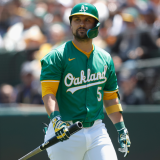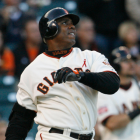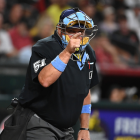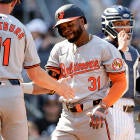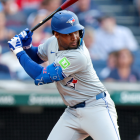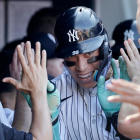 |
| You can be forgiven for suspecting Ryan Braun might have something to do with the Brewers' core. (Getty Images/EOB) |
In order to prime you for the 2013 season, we here at Eye on Baseball have been examining each team's "core." The march toward all 30 clubs continues with the Milwaukee Brewers, who are coming off a third-place finish in the top-heavy NL Central.
If you've been with us for the entirety of this ongoing series, then feel free to skip the blockquoted section that follows, which is an explanation of what a "core" is and what constitutes a team's core ...
What's a core? For our purposes, a team's core comprises a "cornerstone player," a "face of the franchise" and then the "future face of the franchise."
So what's a "cornerstone player"? For starters, it's one of the best players on the roster and perhaps the very best player on the roster. Beyond that, though, it's the player whom the organization has identified as the talent around which to build by signing him to a long-term deal. In other words, they've backed their faith in the player's abilities with the most powerful statement of all: lots of redeemable U.S. currency. Not only do they see this player as central to their current aims but also to their designs on future contention.
What's a "face of the franchise"? He -- and we're getting subjective here -- is the player who most prominently embodies the franchise in question. He's that player you think about when you think about this team. Is he the same guy as the "cornerstone"? Sometimes. But the cornerstone is primarily a financial designation. The "face" is, for lack of a better term, a cultural identifier. They're not mutually exclusive, but they're not not mutually exclusive, either. What about the word "values" you see in the headline above? After we identify and evaluate the three elements of the core, we're going to slap a letter grade on the whole thing.
And now, the core of the Brewers ...
| Core Values series |
| Previous posts |
Cornerstone player(s): Ryan Braun
Braun made his major-league debut on May 25, 2007 and on May 15, 2008, the Brewers signed him to an eight-year, $45 million deal. In April 2011, the Brewers extended him through 2020 (plus a mutual option for 2021) at a minimum cost of $109 million. In other words, Braun has spent less than a calendar year of his major-league life not under a multi-year deal. It's as though the Brewers identified Braun as a cornerstone talent the instant that he arrived in Milwaukee. The breadth of their investment -- particularly considering the size of their market -- tells the rest of the story.
Face(s) of the franchise: Braun
Since Braun hit the bigs, he has seen come and go notable teammates like Prince Fielder, CC Sabathia, Zack Greinke, J.J. Hardy, Alcides Escobar and others. The constant in Milwaukee has been Braun. And his constancy has been impossible to ignore.
In six major-league seasons, these are his laurels: NL Rookie of the Year in 2007, NL MVP in 2011, NL MVP runner-up in 2012, third place in NL MVP balloting in 2008, five-time All-Star, five-time Silver Slugger, one of just 38 players to hit at least 200 home runs and 200 doubles before age 29. Oh, and in three postseason series, Braun has batted .379/.422/.638.
Face(s) of the future: Braun
Yep: It's Braun. Braun is entering his age-29 season, but, as noted above, he's locked up through at least 2020, when he'll be 36. As "faces of the future" go, Braun is not especially young, but he earns this honor for two reasons.
First and foremost, Braun is one of the best players in baseball and figures to remain as much for at least the next handful of seasons. We know about his present excellence (career OPS+ of 147), but it's his rare profile that makes him a good bet to age well. He's a high-average power hitter who also sports a better-than-average contact rate. In other words, Braun puts bat on ball at an impressive clip, particularly for a hitter with such impressive power numbers.
As well, he's fast. Braun's coming off back-to-back 30-steal seasons, and he has 29 career triples. Also, take a look at Braun's steadily improving defensive numbers in left (recall that Braun was a shortstop and third baseman in college and a third baseman during his rookie season) and you'll see a fielder who, at least according to ultimate zone rating, now grades out as a plus at the position.
All of this makes Braun an excellent, first-order performer in the here and now, but those attributes -- the power in tandem with the high contact rate, the speed on the bases, the improving defensive snapshot -- also make him a player who figures to age well. Yes, Braun's locked up deep into his 30s, but his skill set is such that his decline phase might not set in at the typical age. Braun is going to be an elite ballplayer for a while.
The other reason that Braun embodies the future is that there's no one in the Brewers' pipeline who figures to supplant him anytime soon. That's at once an endorsement of Braun's awesome skills and mounting legacy and an indictment of the Brewers' system. Among those presently on the roster, Rickie Weeks and Yovani Gallardo are impressive enough. Aramis Ramirez is coming off an outstanding season, and Marco Estrada has breakout potential. However, they are but complementary pieces.
In the farm system, there's not much upside. Young right-handers like Wily Peralta, Tyler Thornburg, Johnny Hellweg and Taylor Jungmann provide depth, but there's likely not a future ace in the bunch. As position players go, only Jean Segura figures to be a plus regular at the highest level.
Brewers' core value: B-. There's no doubting Braun's excellence -- both now and moving forward -- but a one-man core will make it difficult to compete with the likes of the Reds, Cardinals and improving Pirates.
For more baseball news, rumors and analysis, follow @EyeOnBaseball on Twitter, subscribe to the RSS feed and "like" us on Facebook.








